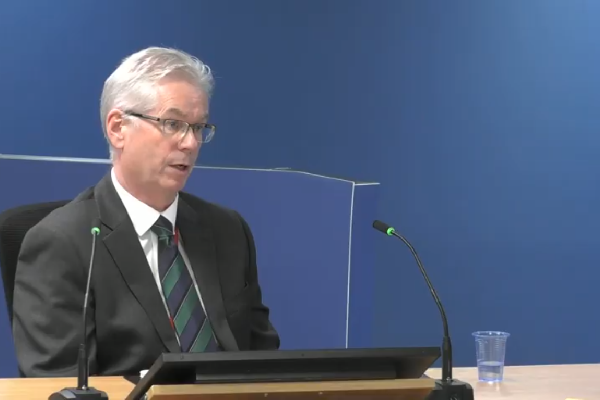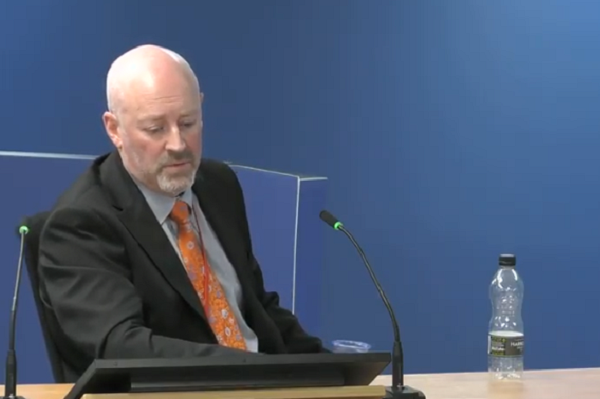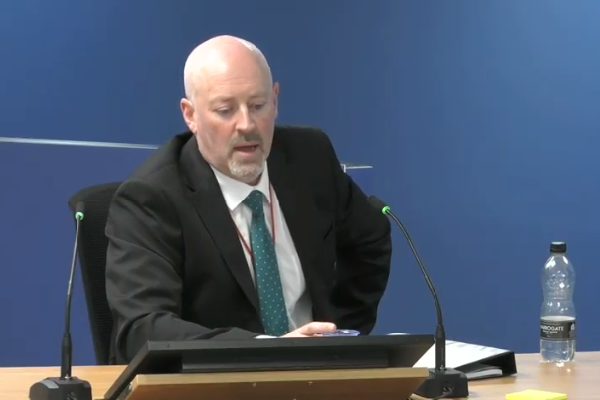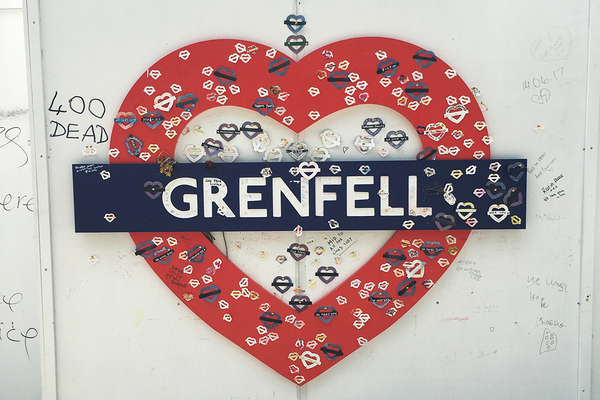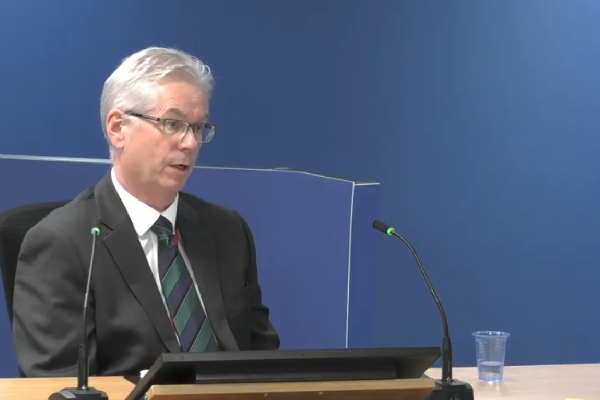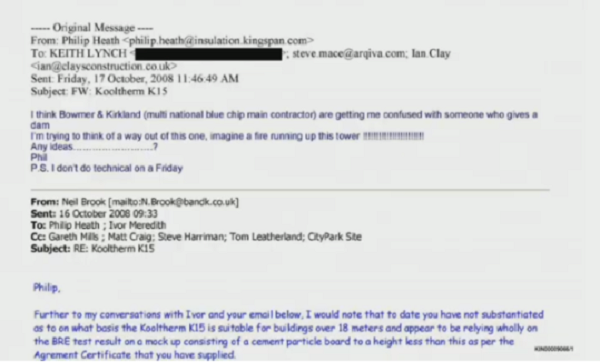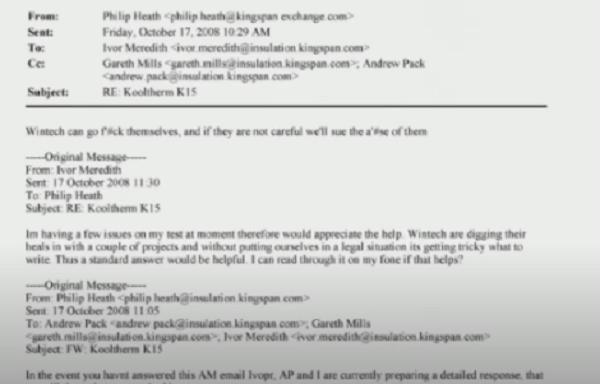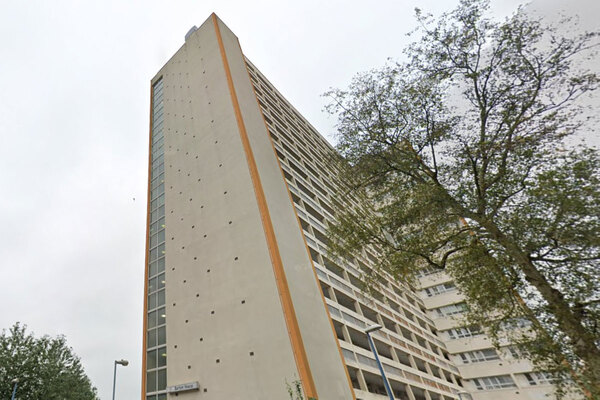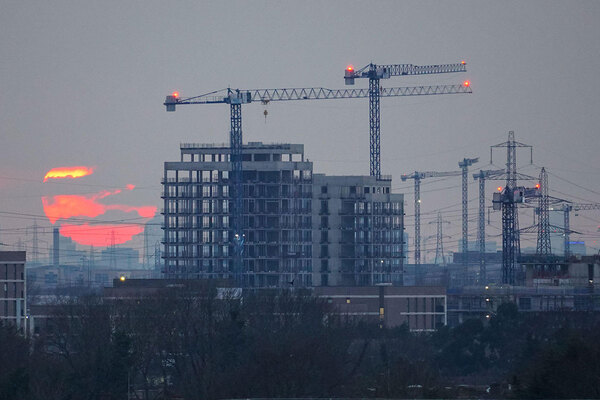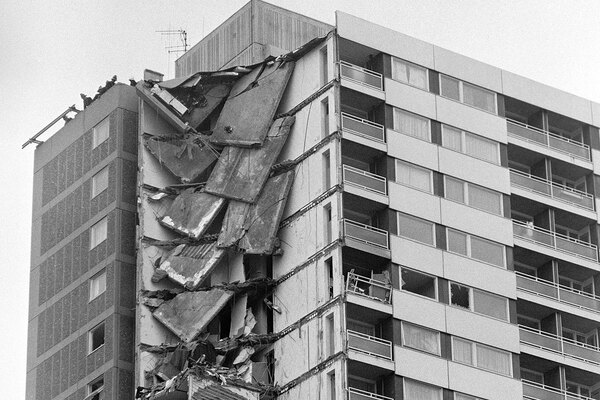Kingspan manager said professionals raising fire concerns could ‘go f*ck themselves’, Grenfell Inquiry hears
A Kingspan manager said that professionals raising fire safety concerns relating to the company’s insulation could “go fuck themselves” or the firm would “sue the arse [off] them” in an email disclosed by the Grenfell Tower Inquiry today.
Philip Heath, a technical manager at the insulation firm, also wrote that a firm which queried the suitability of the product for high rises were “getting me confused with someone who gives a dam [sic]… imagine a fire running up this tower!!!!!!!!!!!”.
Kingspan K15 insulation was among the insulation used on Grenfell Tower, as well as hundreds of high rises nationwide. Lawyers for the survivors have previously said the firm “set the precedent” that combustible insulation could be used on high rises.
The run of emails disclosed today came after a contractor, Bowmer and Kirkland, emailed Kingspan to query whether its insulation could be used on one of its projects, in October 2008.
The firm had questioned whether Kingspan’s official testing could really be used to justify the use of the insulation on their project, as the system tested differed significantly from what they were planning to install.
At this time, combustible insulation was only permitted on high rises in the precise system which had passed a test – meaning the firm’s inquiry was entirely correct.
But Mr Heath forwarded the email to a friend, Keith Lynch, and wrote: “I think [they] are getting me confused with someone who gives a dam [sic]. I’m trying to think of a way out of this one, imagine a fire running up the tower!!!!!!!!!!!!”
He said that Mr Lynch was a “dear friend” who was terminally ill and that he was forwarding him the email “to show him what was going on at the time”.
“I can only apologise for the content of that email… I was in a dark place because of Keith being terminally ill and dealing with Bowmer and Kirkland was not my number one priority at the time,” he said.
Bowmer and Kirkland then forwarded the query to a facade engineering consultancy, Wintech, which advised Bowmer and Kirkland that Kingspan insulation would not be appropriate. “Kingspan keep repeating that the product… is suitable for use in buildings over 18m. What they fail to say is that it is suitable only in the configuration tested,” wrote Greg Sinclair, a consultant at the firm.
When the contractor came back to Kingspan with a further query as a result, Mr Heath sent an internal email to two colleagues saying: “Wintech can go f*ck themselves and if they are not careful we will sue the arse of them [sic],” he wrote.
“It was totally unprofessional… I think it was just frustration that we were going round in circles with them,” Mr Heath – who still works for Kingspan, identifying international business opportunities – replied.
“Do you agree that this reflected a culture within Kingspan at the time?” asked Kate Grange QC, counsel to the inquiry.
“No, I don’t believe so,” he said. “Like any organisation you have your good times and difficult times, we were just going round in a circle with Wintech and some frustration has come out on a Friday afternoon.”
The development in question was referred to as City Park, and was said to have a ceramic cladding system, but the inquiry did not disclose the specific location of the building.
Last week the inquiry heard how Kingspan threatened a building control body, the National House Building Council, with legal action when it said it would make it clear to clients that Kingspan should not be used on high rises outside the system tested.
The inquiry has also heard how Kingspan passed a large-scale test with its K15 insulation as part of a mock wall with cement particle board cladding in 2005.
But it then marketed it as suitable for use on high rises generally - not making it clear that it was only permitted as part of the specific system tested.
In 2006, it changed the way K15 was made - altering the chemical composition of the product and adding perforations to the foil facing.
When this new insulation was retested as part of a system with solid aluminium cladding after these changes, it dramatically failed.
An internal report called the test a “raging inferno” and added that the insulation was “burning on its own steam” and the Building Research Establishment (who carried out the test) “had to extinguish the test early because it was endangering setting fire the laboratory”.
The report said the new technology was “very different” to the previous version which turned to a light ash when burnt, whereas this material “burnt very ferociously”.
Separate testing also showed it had a lower ignition temperature and gave off more heat in a fire.
Asked whether Kingspan should have withdrawn the product from the high rise market at this point, Mr Heath conceded that “with hindsight” it should have.
"Do you accept that there existed no test evidence during the period you were technical manager that K15 as being sold complied with the requirements for use above 18m?" Ms Grange asked.
"With hindsight I can see why you have made that comment," he said.
"What I would suggest to you is that you directed that as a position that Kingspan were taking and you endorsed it at the time," she asked.
"I believe there was a collective and belief in that respect, it wasn't just one person," he said.
Nonetheless, Kingspan continued to sell it for use on high rises and even used the 2005 test to gain certification from respected independent certifiers the British Board of Agrement and Local Authority Building Control (LABC) asserting that the product was suitable for high rises.
Neither organisation was told of the product change, the reduced fire performance or the failed tests.
The LABC certificate said K15 “can be considered a material of limited combustibility” and was therefore suitable for use in “all situations” on high rises.
No plastic insulation could ever achieve a rating of limited combustibility (the basic standard for use on high rises) - a fact Mr Heath knew.
But on receiving this certificate, Mr Heath wrote internally that this was “GREAT NEWS!” with the the “highlight” of the report the line on limited combustibility.
Asked by a senior member of the firm how he obtained it, he said: “We can be very convincing when we need to be, we threw every bit of fire test data we could at him, we probably blocked his server.
"In the end I think LABC convinced themselves [K15] is the best thing since sliced bread. We didn’t even have to get any real ale down him!”
"What I'm suggesting to you is that you knew that certificate was misleading and you celebrated it because it was an open ticket to install [K15] on high rise buildings, didn't you?" asked Ms Grange
"I don't think that's the case, no," replied Mr Heath. He explained that he believed the phrase simply meant the product could be treated as limited combustibility if it was used in the system Kingspan tested. This was not what the certificate said.
Later emails from Mr Heath showed him saying that he believed further testing of the product could be stopped, as the certificates alone would satisfy queries about its use.
"This was a get out of jail card wasn't it?" said Ms Grange. "You were coming under pressure prior to this certificat e to justify the use of K15... and then this falls into your lap and it buys time during which K15 can continue being installed on high rise buildings, that's the reality isn't it?"
"Tests were continuing, it's not like we completely stopped," he said. "In relation to large scale tests we were stopping testing, but from a technical process side of things there were still small scale tests being undertaken."
Ms Grange asked Mr Heath why none of the emails showed any concern for life safety. "It's there in black and white isn't it, we see a complete absence of consideration of life safety," she said.
"I don't believe it was the mindset of Kingspan at the time, but on reflection I can see that, yes," he replied.
Mr Heath said he has never been disciplined for his role in bringing K15 to market.
The inquiry continues.
Sign up for our weekly Grenfell Inquiry newsletter
Each week we send out a newsletter rounding up the key news from the Grenfell Inquiry, along with the headlines from the week
Already have an account? Click here to manage your newsletters
